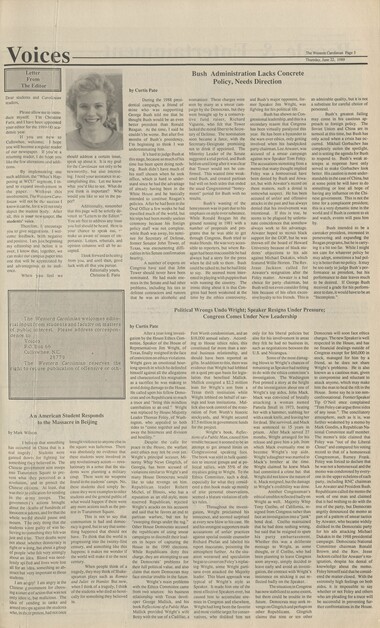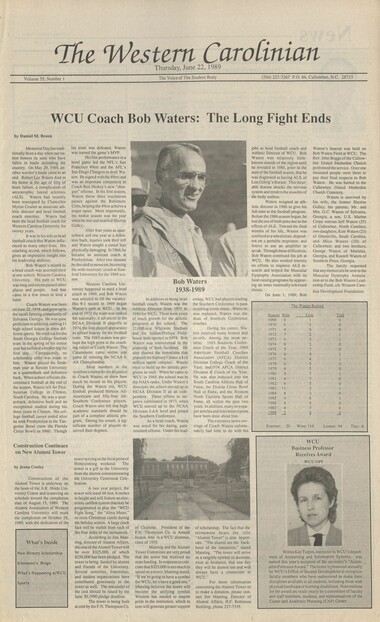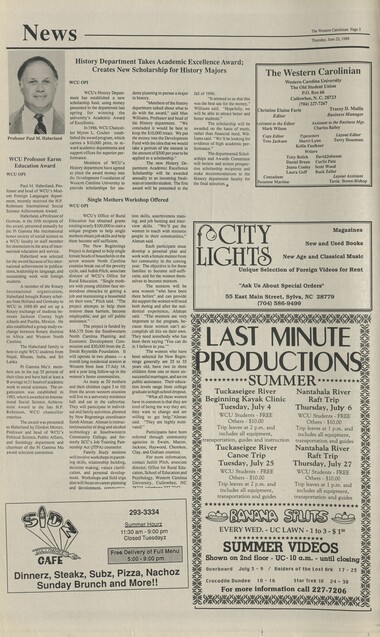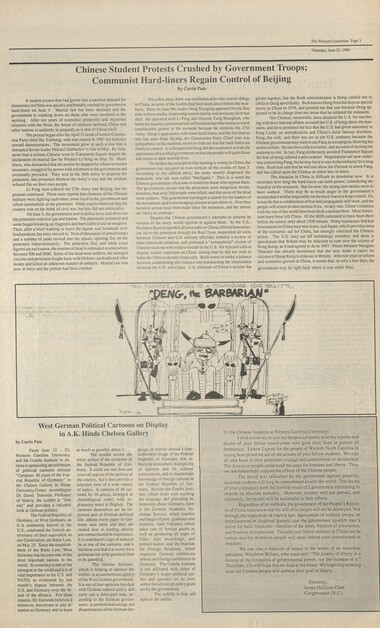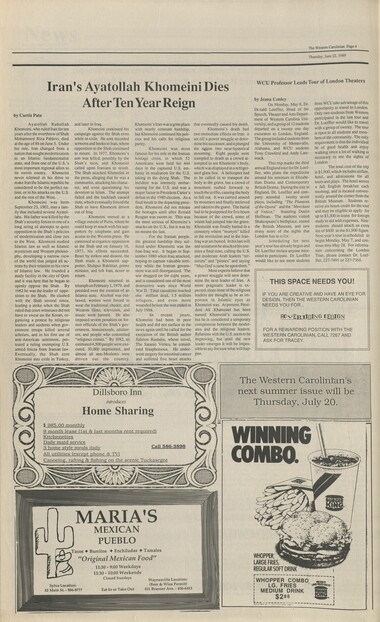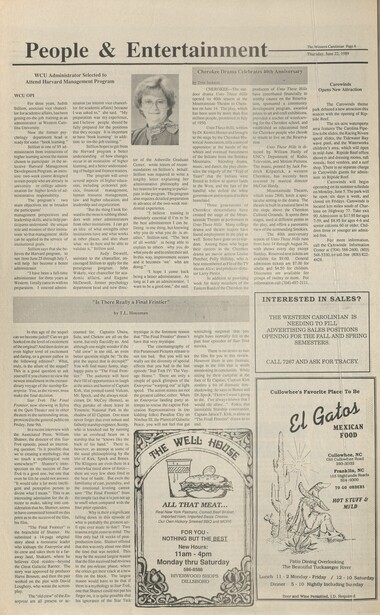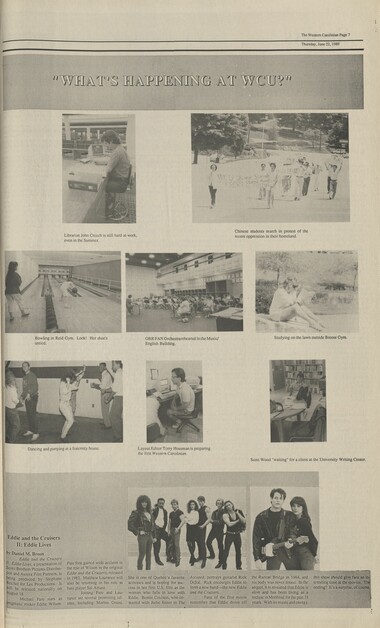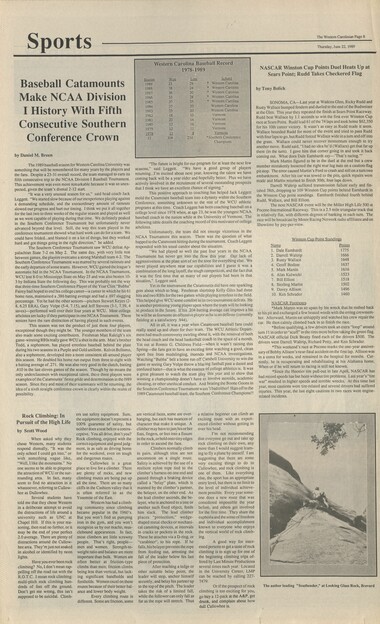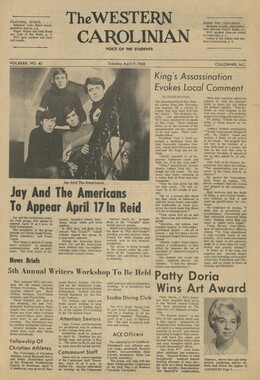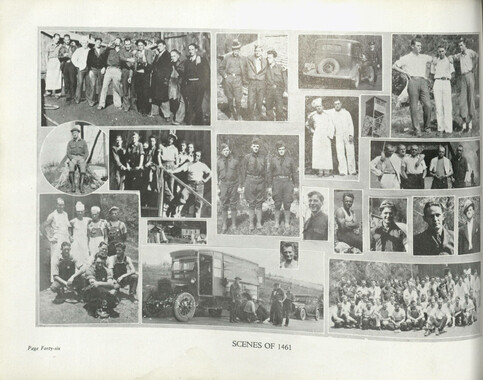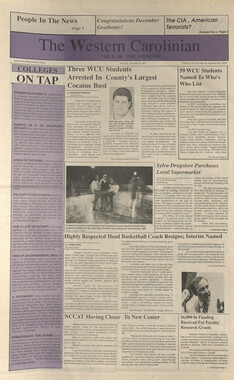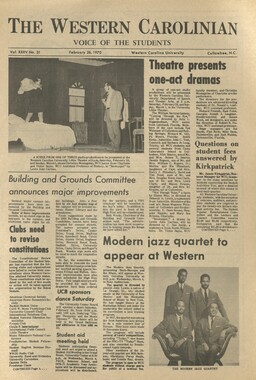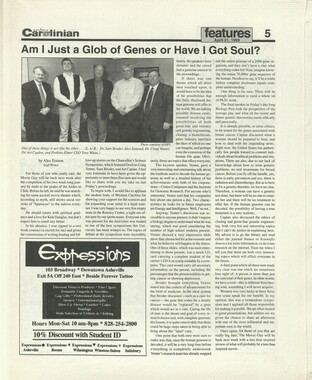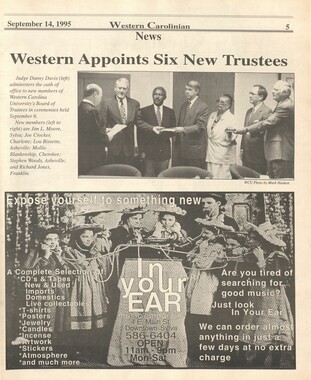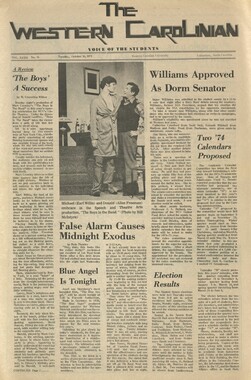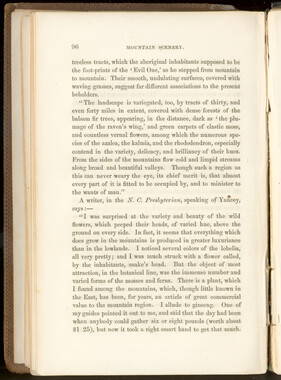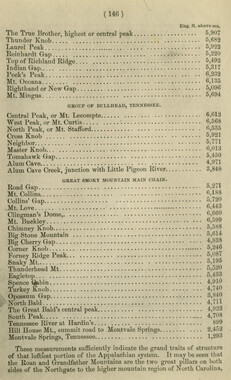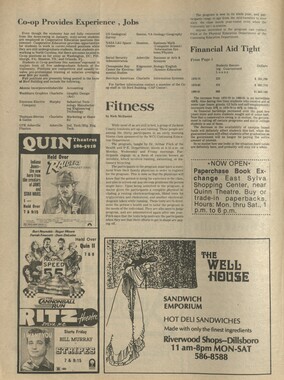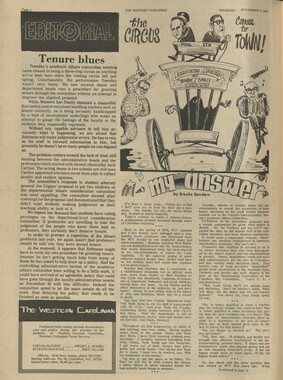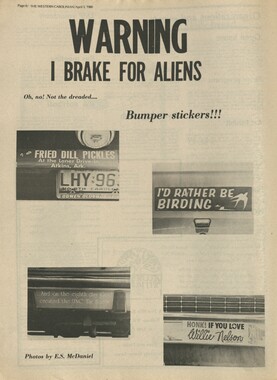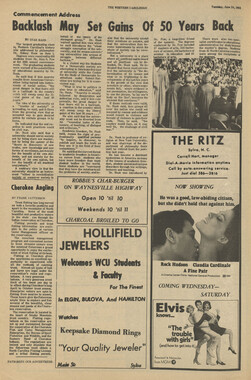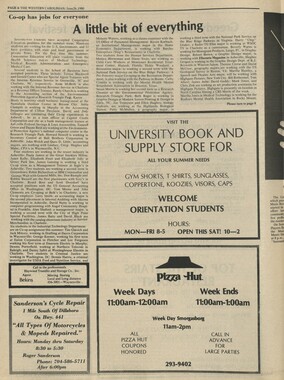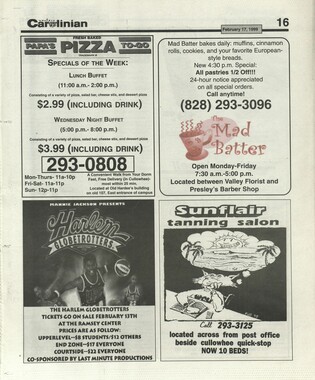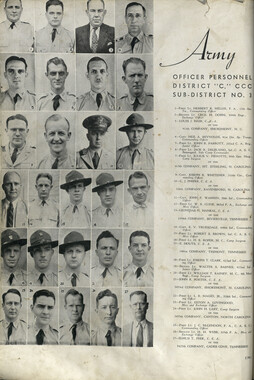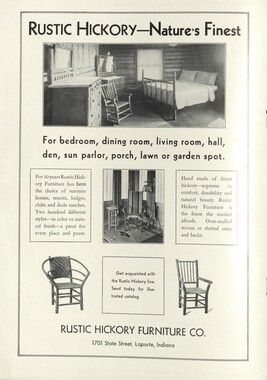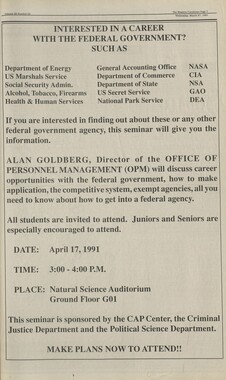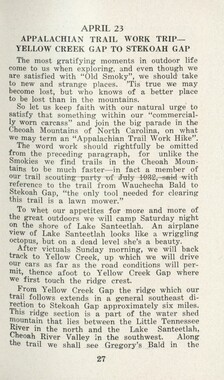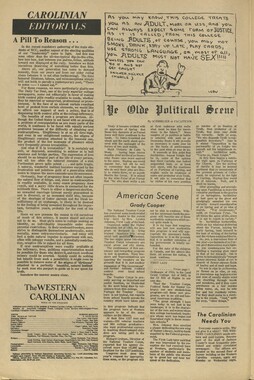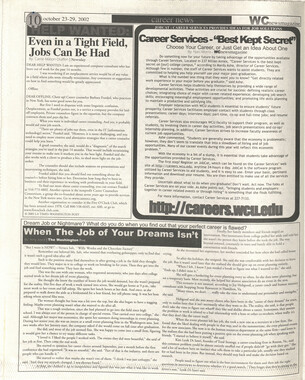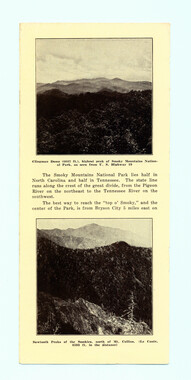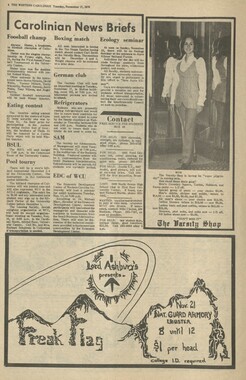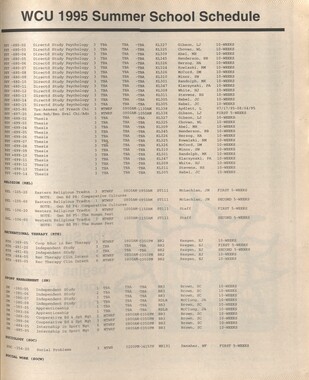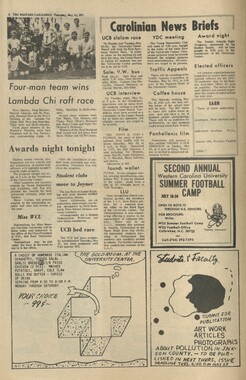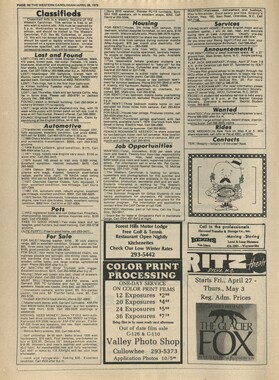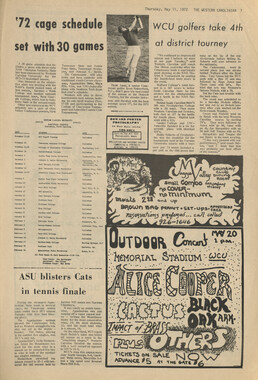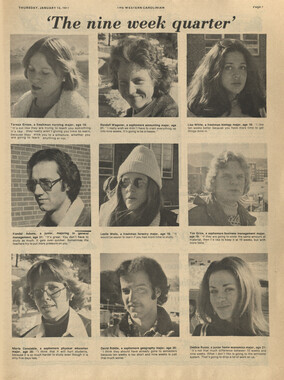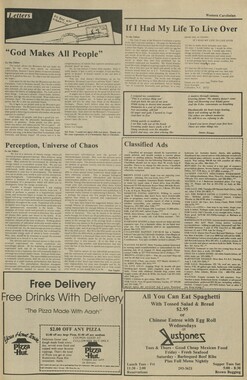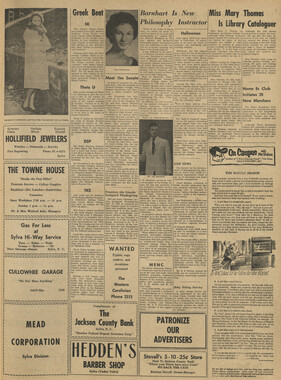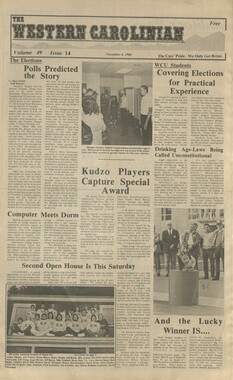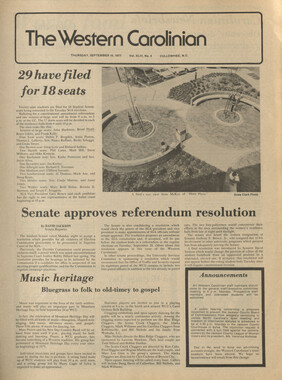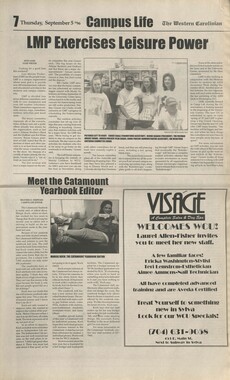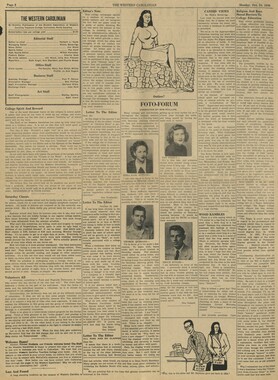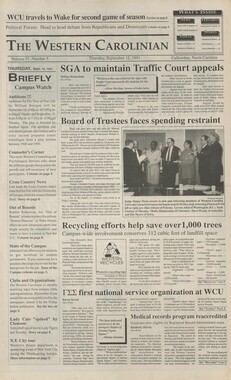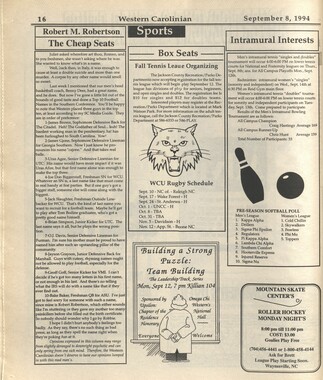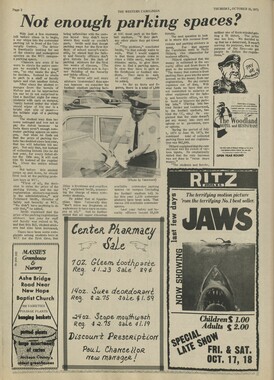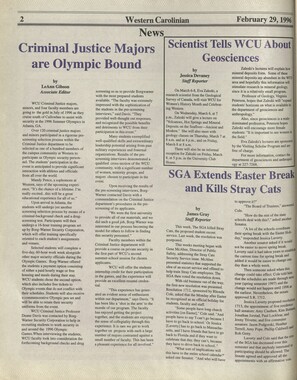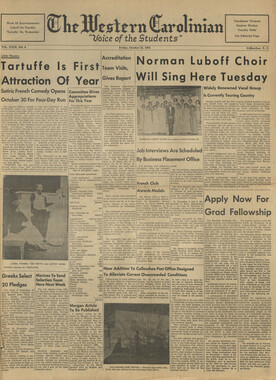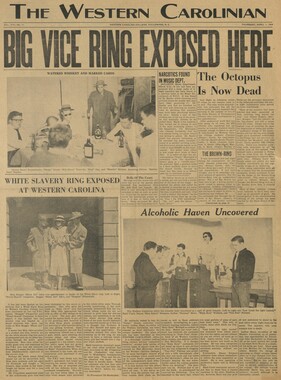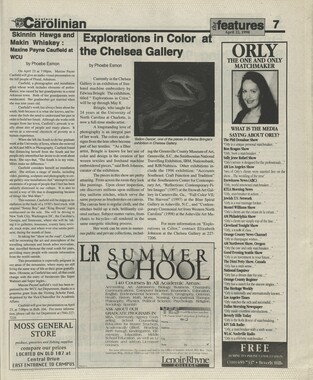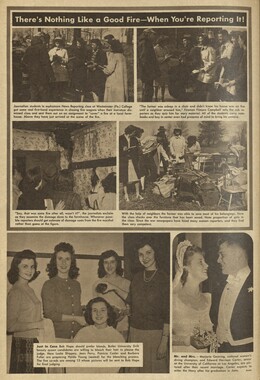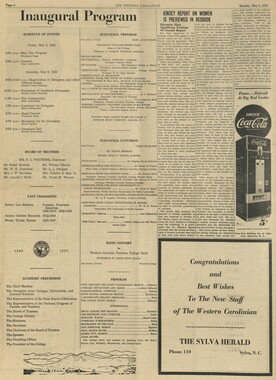Western Carolina University (20)
View all
- Canton Champion Fibre Company (2308)
- Cherokee Traditions (292)
- Civil War in Southern Appalachia (165)
- Craft Revival (1942)
- Great Smoky Mountains - A Park for America (2766)
- Highlights from Western Carolina University (430)
- Horace Kephart (941)
- Journeys Through Jackson (154)
- LGBTQIA+ Archive of Jackson County (85)
- Oral Histories of Western North Carolina (314)
- Picturing Appalachia (6772)
- Stories of Mountain Folk (413)
- Travel Western North Carolina (160)
- Western Carolina University Fine Art Museum Vitreograph Collection (129)
- Western Carolina University Herbarium (92)
- Western Carolina University: Making Memories (708)
- Western Carolina University Publications (2283)
- Western Carolina University Restricted Electronic Theses and Dissertations (146)
- Western North Carolina Regional Maps (71)
- World War II in Southern Appalachia (131)
University of North Carolina Asheville (6)
View all
- Western Carolina College (199)
- Western Carolina Teachers College (239)
- Western Carolina University (1792)
- Allanstand Cottage Industries (0)
- Appalachian National Park Association (0)
- Bennett, Kelly, 1890-1974 (0)
- Berry, Walter (0)
- Brasstown Carvers (0)
- Cain, Doreyl Ammons (0)
- Carver, George Washington, 1864?-1943 (0)
- Cathey, Joseph, 1803-1874 (0)
- Champion Fibre Company (0)
- Champion Paper and Fibre Company (0)
- Cherokee Indian Fair Association (0)
- Cherokee Language Program (0)
- Crittenden, Lorraine (0)
- Crowe, Amanda (0)
- Edmonston, Thomas Benton, 1842-1907 (0)
- Ensley, A. L. (Abraham Lincoln), 1865-1948 (0)
- Fromer, Irving Rhodes, 1913-1994 (0)
- George Butz (BFS 1907) (0)
- Goodrich, Frances Louisa (0)
- Grant, George Alexander, 1891-1964 (0)
- Heard, Marian Gladys (0)
- Kephart, Calvin, 1883-1969 (0)
- Kephart, Horace, 1862-1931 (0)
- Kephart, Laura, 1862-1954 (0)
- Laney, Gideon Thomas, 1889-1976 (0)
- Masa, George, 1881-1933 (0)
- McElhinney, William Julian, 1896-1953 (0)
- Niggli, Josephina, 1910-1983 (0)
- North Carolina Park Commission (0)
- Osborne, Kezia Stradley (0)
- Owens, Samuel Robert, 1918-1995 (0)
- Penland Weavers and Potters (0)
- Rhodes, Judy (0)
- Roberts, Vivienne (0)
- Roth, Albert, 1890-1974 (0)
- Schenck, Carl Alwin, 1868-1955 (0)
- Sherrill's Photography Studio (0)
- Smith, Edward Clark (0)
- Southern Highland Handicraft Guild (0)
- Southern Highlanders, Inc. (0)
- Stalcup, Jesse Bryson (0)
- Stearns, I. K. (0)
- Thompson, James Edward, 1880-1976 (0)
- United States. Indian Arts and Crafts Board (0)
- USFS (0)
- Vance, Zebulon Baird, 1830-1894 (0)
- Weaver, Zebulon, 1872-1948 (0)
- Western Carolina University. Mountain Heritage Center (0)
- Whitman, Walt, 1819-1892 (0)
- Wilburn, Hiram Coleman, 1880-1967 (0)
- Williams, Isadora (0)
- 1920s (57)
- 1930s (69)
- 1940s (114)
- 1950s (66)
- 1960s (314)
- 1970s (599)
- 1980s (406)
- 1990s (379)
- 2000s (195)
- 2010s (83)
- 1600s (0)
- 1700s (0)
- 1800s (0)
- 1810s (0)
- 1820s (0)
- 1830s (0)
- 1840s (0)
- 1850s (0)
- 1860s (0)
- 1870s (0)
- 1880s (0)
- 1890s (0)
- 1900s (0)
- 1910s (0)
- 2020s (0)
- Jackson County (N.C.) (2282)
- Appalachian Region, Southern (0)
- Asheville (N.C.) (0)
- Avery County (N.C.) (0)
- Blount County (Tenn.) (0)
- Buncombe County (N.C.) (0)
- Cherokee County (N.C.) (0)
- Clay County (N.C.) (0)
- Graham County (N.C.) (0)
- Great Smoky Mountains National Park (N.C. and Tenn.) (0)
- Haywood County (N.C.) (0)
- Henderson County (N.C.) (0)
- Knox County (Tenn.) (0)
- Knoxville (Tenn.) (0)
- Lake Santeetlah (N.C.) (0)
- Macon County (N.C.) (0)
- Madison County (N.C.) (0)
- McDowell County (N.C.) (0)
- Mitchell County (N.C.) (0)
- Polk County (N.C.) (0)
- Qualla Boundary (0)
- Rutherford County (N.C.) (0)
- Swain County (N.C.) (0)
- Transylvania County (N.C.) (0)
- Watauga County (N.C.) (0)
- Waynesville (N.C.) (0)
- Yancey County (N.C.) (0)
- Newsletters (510)
- Publications (documents) (1773)
- Aerial Photographs (0)
- Aerial Views (0)
- Albums (books) (0)
- Articles (0)
- Artifacts (object Genre) (0)
- Bibliographies (0)
- Biography (general Genre) (0)
- Cards (information Artifacts) (0)
- Clippings (information Artifacts) (0)
- Crafts (art Genres) (0)
- Depictions (visual Works) (0)
- Design Drawings (0)
- Drawings (visual Works) (0)
- Envelopes (0)
- Facsimiles (reproductions) (0)
- Fiction (general Genre) (0)
- Financial Records (0)
- Fliers (printed Matter) (0)
- Glass Plate Negatives (0)
- Guidebooks (0)
- Internegatives (0)
- Interviews (0)
- Land Surveys (0)
- Letters (correspondence) (0)
- Manuscripts (documents) (0)
- Maps (documents) (0)
- Memorandums (0)
- Minutes (administrative Records) (0)
- Negatives (photographs) (0)
- Newspapers (0)
- Occupation Currency (0)
- Paintings (visual Works) (0)
- Pen And Ink Drawings (0)
- Periodicals (0)
- Personal Narratives (0)
- Photographs (0)
- Plans (maps) (0)
- Poetry (0)
- Portraits (0)
- Postcards (0)
- Programs (documents) (0)
- Questionnaires (0)
- Scrapbooks (0)
- Sheet Music (0)
- Slides (photographs) (0)
- Songs (musical Compositions) (0)
- Sound Recordings (0)
- Specimens (0)
- Speeches (documents) (0)
- Text Messages (0)
- Tintypes (photographs) (0)
- Transcripts (0)
- Video Recordings (physical Artifacts) (0)
- Vitreographs (0)
- The Reporter, Western Carolina University (510)
- WCU Students Newspapers Collection (1744)
- A.L. Ensley Collection (0)
- Appalachian Industrial School Records (0)
- Appalachian National Park Association Records (0)
- Axley-Meroney Collection (0)
- Bayard Wootten Photograph Collection (0)
- Bethel Rural Community Organization Collection (0)
- Blumer Collection (0)
- C.W. Slagle Collection (0)
- Canton Area Historical Museum (0)
- Carlos C. Campbell Collection (0)
- Cataloochee History Project (0)
- Cherokee Studies Collection (0)
- Daisy Dame Photograph Album (0)
- Daniel Boone VI Collection (0)
- Doris Ulmann Photograph Collection (0)
- Elizabeth H. Lasley Collection (0)
- Elizabeth Woolworth Szold Fleharty Collection (0)
- Frank Fry Collection (0)
- George Masa Collection (0)
- Gideon Laney Collection (0)
- Hazel Scarborough Collection (0)
- Hiram C. Wilburn Papers (0)
- Historic Photographs Collection (0)
- Horace Kephart Collection (0)
- Humbard Collection (0)
- Hunter and Weaver Families Collection (0)
- I. D. Blumenthal Collection (0)
- Isadora Williams Collection (0)
- Jesse Bryson Stalcup Collection (0)
- Jim Thompson Collection (0)
- John B. Battle Collection (0)
- John C. Campbell Folk School Records (0)
- John Parris Collection (0)
- Judaculla Rock project (0)
- Kelly Bennett Collection (0)
- Love Family Papers (0)
- Major Wiley Parris Civil War Letters (0)
- Map Collection (0)
- McFee-Misemer Civil War Letters (0)
- Mountain Heritage Center Collection (0)
- Norburn - Robertson - Thomson Families Collection (0)
- Pauline Hood Collection (0)
- Pre-Guild Collection (0)
- Qualla Arts and Crafts Mutual Collection (0)
- R.A. Romanes Collection (0)
- Rosser H. Taylor Collection (0)
- Samuel Robert Owens Collection (0)
- Sara Madison Collection (0)
- Sherrill Studio Photo Collection (0)
- Smoky Mountains Hiking Club Collection (0)
- Stories of Mountain Folk - Radio Programs (0)
- Venoy and Elizabeth Reed Collection (0)
- WCU Gender and Sexuality Oral History Project (0)
- WCU Mountain Heritage Center Oral Histories (0)
- WCU Oral History Collection - Mountain People, Mountain Lives (0)
- Western North Carolina Tomorrow Black Oral History Project (0)
- William Williams Stringfield Collection (0)
- Zebulon Weaver Collection (0)
- College student newspapers and periodicals (1769)
- African Americans (0)
- Appalachian Trail (0)
- Artisans (0)
- Cherokee art (0)
- Cherokee artists -- North Carolina (0)
- Cherokee language (0)
- Cherokee pottery (0)
- Cherokee women (0)
- Church buildings (0)
- Civilian Conservation Corps (U.S.) (0)
- Dams (0)
- Dance (0)
- Education (0)
- Floods (0)
- Folk music (0)
- Forced removal, 1813-1903 (0)
- Forest conservation (0)
- Forests and forestry (0)
- Gender nonconformity (0)
- Great Smoky Mountains National Park (N.C. and Tenn.) (0)
- Hunting (0)
- Landscape photography (0)
- Logging (0)
- Maps (0)
- Mines and mineral resources (0)
- North Carolina -- Maps (0)
- Paper industry (0)
- Postcards (0)
- Pottery (0)
- Railroad trains (0)
- Rural electrification -- North Carolina, Western (0)
- School integration -- Southern States (0)
- Segregation -- North Carolina, Western (0)
- Slavery (0)
- Sports (0)
- Storytelling (0)
- Waterfalls -- Great Smoky Mountains (N.C. and Tenn.) (0)
- Weaving -- Appalachian Region, Southern (0)
- Wood-carving -- Appalachian Region, Southern (0)
- World War, 1939-1945 (0)
- Text (2283)
- MovingImage (0)
- Sound (0)
- StillImage (0)
Western Carolinian Volume 55 Number 01
Item
Item’s are ‘child’ level descriptions to ‘parent’ objects, (e.g. one page of a whole book).
-
-
Voices The Western Carolinian Page 5 Thursday, June 22, 1989 Dear students and Carolinian readers, Please allow me to introduce myself. I'm Christine Faris, and I have been appointed your editor for the 1989-90 academic year. If you are new to Cullowhee, welcome; I hope you will become a regular reader of our newspaper. If you're a returning reader, I do hope you like the few alterations and additions. By implementing one such addition, the "What's Happening at WCU" segment, I intend to expand involvement in the paper. Without this involvement, The Western Carolinian will not be the success I know it can be, for it will not truly depict the student body. After all, this is your newspaper, the students' voice. Therefore, I encourage you to give suggestions. I welcome feedback, both negative and positive. I am just beginning my editorship and before it is over, I know that, together, we can make our campus paper into one that will be appreciated by and advantageous to its audience. When you feel we Bush Administration Lacks Concrete Policy, Needs Direction should address a certain issue, speak up about it. It is my goal for the Carolinian not only to be newsworthy, but also interesting. I need your assistance in accomplishing this. Let me know what you'd like to see. What do you think is important? Who would you like to see in the paper? Additionally, remember that this page will be stricUy devoted to "Letters to the Editor." You are free to address any issue you feel should be heard. Here is your chance to speak out, f make us aware of issues of importance. Letters, rebuttals, and opinion columns will all be accepted. I look forward to hearing from you, and until then, good luck with all that you pursue. Editorially yours, Christine E. Faris The Western Carolinian welcomes editorial input from students and faculty on matters of public interest. Please address correspon-i dence to: Voices :■■: P.O. Box 66 Cullowhee, N.C , 28779 The Western Carolinian reserves the right to refuse publication of offensive or oth- n American Student Responds to the Massacre in Beijing by Mark Wilson I believe that something has occurred in China that is a real tragedy. Students were gunned down for fighting for something they believed in. The Chinese government sent troops into Tiananmen Square to prevent what l.hcy perceived as a revolution, and to protect the Chinese citiizcns. At least, that wasthcirju'stificationforsending in the army troops. The govcrnmen t's actions brought about the deaths of hundreds of innocent st udents, and for that the whole world should pause and mourn. The only thing that the students v/cre guilty of was bc- lieving in something they felt was just and true. Their deaths were not about whether democracy is right or w rong, but about a group of people who felt very strongly about an idea. Blood was needlessly spi lied and lives were lost all for an idea, something so abstract but very important to those students. I am angry! I am angry at the Chinese government for choosing a coun ;e of action that was not only idiot ic, but malicious. The idea of <;ending in tanks and armed troops against the students who, in tin ;ir protest, had not once brought violence to anyone else in the square was ludicrous. There was absolutely no evidence that these students were involved in any revolutionary action — revolutionary in a sense that the students were planning a military coup. There were no weapons found in the students'camps. No, these students died simply because they were examples to other students and the general public of what would happen if there were any more actions such as the protest in Tiananmen Square. This is not to say that communism is bad and democracy is good, but to say that something happened that should not have. To think that the world is progressing into the twenty-first century, and something like this happens; it makes me wonder if the world will make it to the next century. When people think of a tragedy, they may think of Shakespearean plays such as Romeo and Juliet or Hamlet. But now, when I think of a tragedy, I think of the students who died so heroically for something they believed in. by Curtis Pate During the 1988 presidential campaign, a friend of mine who was supporting George Bush told me that he thought Bush would be an even better president than Ronald Reagan. At the time, I said he couldn't be worse. But after five months of Bush's presidency, I'm beginning to think I was underestimating him. It's hard to judge Bush at this stage, because so much of his time has been spent doing nothing. Bush didn't have much of his staff chosen when he took office, which is hard to understand since he had the advantage of already having been in the White House and he basically intended to continue Reagan's policies. Afterhehadbecninthe Oval Office a few weeks he had travelled much of the world, but his trips had been mostly useless ceremony because his foreign policy staff was not complete, while Bush was away, his nominee for Secretary of Defense, former Senator John Tower, of Texas, was encountering difficulties in his Senate confirmation hearing. A number of experts on Congress have said that John Tower should never have been nominated. He had made enemies in the Senate and had other problems, including his ties to defense contractors and rumors that he was an alcoholic and womanizer. These charges were seen by many as a smear campaign by the Democrats, but they were brought up by a conservative fund raiser, Richard Viguerie, who felt that Tower lacked the moral fiber to be Secretary of Defense. The nomination soon became a farce, with the Secretary-Designate promising not to drink if appointed. The Minority Leader of the Senate suggested a trial period, and Bush held on until long after it was clear that Tower would not be confirmed. This wasted time weakened Bush, and created partisan bad will on both sides that ended the usual Congressional "honeymoon" period for Bush with no results. Bush's wasting of the honeymoon was in part due to his emphasis on style over substance. While Ronald Reagan hit the ground running in 1981 with a number of proposals and programs that he was able to get through Congress, Bush tried to make friends. He was very accessible to reporters, but where Reagan had been inaccessible he had always had a story for the press when he did talk to them. Bush could be talked to, but he had litde to say. He seemed more interested in playing with puppies than with running the country. The ironic thing about it is that Congress had been weakened at the time by the ethics controversy, and Bush's major opponent, former Speaker Jim Wright, was fighting for his political life. Bush has shown no Congressional leadership, and this is a secondary reason that Congress has been virtually paralyzed this year. He has been a bystander to the wars over ethics, only getting involved when his handpicked party chairman, Lee Atwater, was accused of a smear campaign against new Speaker Tom Foley. The accusations stemming from a memo that many thought implied Foley was a homosexual have been denied by Bush and Atwater, but with Atwater's record on these matters, such a denial is somewhat suspect. He has been accused of unfair and offensive attacks in the past and has always denied that his involvement was intentional. If this is true, he seems to be plagued by unfortunate coincidences that somehow always work to his advantage. Atwater hoped to recruit black support for the GOP, but he was thrown off the board of Howard University because of black students' objections to his ads against Michael Dukakis, which featured Willie Horton. The Rev. Jesse Jackson called for Atwater's resignation after the Foley matter. Atwater is a bad choice for party chairman, but Bush will not even consider firing him because of his often excessive loyalty to his friends. This is an admirable quality, but it is not a substitute for careful choice of personnel. Bush's greatest failing may come in his cautious approach to foreign policy. The Soviet Union and China are in turmoil at this time, but Bush has only acted when a crisis has occurred. Mikhail Gorbachev has completely stolen the spotlight, and is setting the agenda for Bush to respond to. Bush's weak attempts at response have only served to make Gorbachev look better. His caution is more understandable in the case of China, but at some point he will have to do something or lose all hope of having any influence on the Chinese government. This is not the time for a complacent president; this is a very dynamic time in the world and if Bush is content to sit and watch, events will pass him by. Bush intended to be a caretaker president, interested in persevering and expanding the Reagan programs, but he is carrying it a bit too far. While I might not care for whatever policy he may adopt, sometimes a bad policy is better than no policy. It may be too early to judge Bush's performance as president, but his performance to date leaves much to be desired. If George Bush received a grade for his performance to date, it would have to be an "Incomplete." Political Wrongs Undo Wright; Speaker Resigns Under Pressure; Congress Comes Under New Leadership by Curtis Pate After a year-long investigation by the House Ethics Committee, Speaker of the House of Representatives Jim Wright, of Texas, finally resigned in the face of conviction on ethics violations. Wright gave an emotional hour- long speech in which he defended himself against all the allegations and characterized his resignation as a sacrifice he was making to avoid doing damage to the House. He called upon his fellow Democrats and on Republicans to reach a truce and "bring this mindless cannibalism to an end." Wright was replaced by House Majority Leader Thomas Foley, of Washington, who appealed to both sides to "come together and put away the bitterness and division and hostility." Despite the calls for peace in the House, the warfare over ethics may not be over yet. Wright's principal accuser, Minority Whip Newt Gingrich, of Georgia, has been accused of violations similar to Wright's and many House Democrats would like to take revenge on him. Republican leader Robert Michel, of Illinois, who has a reputation as an old-style, more reserved Republican, rejected Wright's attacks on his accusers and said that he favors an end to partisan warfare, but not by "sweeping things under the rug." Other House Democrats accused the republicans of using smear campaigns to discredit their leaders in hopes of capturing the House in the 1990 elections. While Republicans deny this charge, they are attempting to use the Democrats' problems for their full political value, and also claim that more Democrats may face similar trouble in the future. Wright's main problems with the Ethics Committee came from two sources: his business relationship with Texas developer George Maffick, and his book Reflections of a Public Man. Mallick provided Wright's wife Betty with the use of a Cadillac, a Fort Worth condominium, and an $18,000 annual salary. According to House ethics rules, this constituted far more than a normal business relationship, and should have been reported as gifts. In addition to this, there was evidence that Wright had lobbied on a quid pro quo basis for legislation that benefited Mallick. Mallick cosigncd a $2.2 million loan for Wright's son from a Texas thrift institution while Wright lobbied on behalf of savings and loan institutions. Mallick also took control of the restoration of Fort Worth's historic stockyards, and Wright secured $7.5 million in government funds for the project. Wright's book, Reflections of a Public Man, caused him trouble because it seemed to be an attempt to get around limits on Congressional speaking fees. The book was sold in bulk quantities to interest groups and at political rallies, with 55% of the royalties going to Wright. To the Ethics Committee, such a deal, especially for what they considered a thin book made up mostly of trite personal observations, seemed a blatant violation of ethics rules. Throughout the investigation, Wright proclaimed his innocence, and seemed surprised at every new blow to his case. He and his strongest supporters made accusations of unfair practices against special outside counselor Richard Phclan and labeled his report inaccurate, poisoning the atmosphere further. As the situation worsened and speculation began to center on Foley's replacing Wright, some Wright partisans even attacked the Majority leader. This blunt approach was typical of Wright's style as Speaker. It made him one of the most effective Speakers ever, but caused him to accumulate enemies in Congress and elsewhere. Wright had long been the favorite and most visible target for conservatives, who disliked him not only for his liberal policies but also for his involvement in areas they felt he had no business in, such as negotiations between the U.S. and Nicaragua. Some of the most damaging blows to Wright's chances of remaining as Speaker had nothing to do with the ethics committee's investigation. The Washington Post printed a story at the height of the investigation about one of Wright's top aides, John Mack. Mack was convicted of brutally attacking a woman named Pamela Small in 1973, beating her with a hammer, stabbing her with a steak knife, and leaving her for dead. She survived, and Mack was sentenced to 15 years in prison. After Mack served 27 months, Wright arranged for his release and gave him a job, from which Mack eventually rose to become Wright's top aide. Wright's daughter was married to Mack's brother at the time. Wright claimed he knew Mack had committed a crime but that Wright did not know the nature of it. Mack resigned, butthedamage to Wright's credibility was done. Another Congressman's ethical troubles reflected badly on Wright as well. Majority Whip Tony Coelho, of California, resigned from Congress rather than face an investigation into a "junk" bond deal. Coelho maintained that he had done nothing wrong, but said that he resigned to spare his party embarrassment. Whether this was a deliberate message to Wright, as some thought, or if Coelho, who had been planning to leave Congress soon anyway, simply decided to leave early and avoid an investigation, the contrast with Wright's insistence on sticking it out reflected badly on the Speaker. The situation in Congress has now stabilized to some extent, but there could be trouble in die future. Democrats may seek revenge on Gingrich and perhaps on other Republicans. Gingrich claims that nine or ten other Democrats will soon face ethics charges. The new Speaker is well respected in the House, and has no financial dealings outside of Congress except for $60,000 in stock, managed for him by a friend, so he does not share Wright's problems. He is also known as a cautious man, given to compromise and reluctant to attack anyone, which may make him the man to heal the rift in the House. Some say he is too non- confrontational. Former Speaker Tip O'Neil once complained "Tom Foley can argue three sides of any issue." The conciliatory atmosphere, such as it is, was further weakened by a memo by Mark Goodin, a Republican National Committee staff member. The memo's title claimed that Foley was "out of the Liberal Closet" and compared his voting record to that of a homosexual Congressman, Barney Frank. Foley was forced to declare that he was not a homosexual and the memo was condemned by everyone in the upper echelons of each party, including RNC chairman Lee Atwater and President Bush. Republicans called the memo the work of one man and claimed that it had nothing to do with the rest of the party, but Democrats angrily denounced the memo as part of a pattern of smear tactics by Atwater, who became widely disliked in the Democratic party for his ads attacking Michael Dukakis in the 1988 presidential campaign. Democratic National Committee chairman Ronald Brown and the Rev. Jesse Jackson called for Atwater's resignation, despite his denial of knowledge about the memo. Foley himself said that he considered the matter closed. With the extremely high feelings on both sides, it is impossible to say whether or not Foley and others who are pleading for a truce will be successful in preventing further confrontations in the House.
Object
Object’s are ‘parent’ level descriptions to ‘children’ items, (e.g. a book with pages).
-
The Western Carolinian is Western Carolina University's student-run newspaper. The paper was published as the Cullowhee Yodel from 1924 to 1931 before changing its name to The Western Carolinian in 1933.
-
